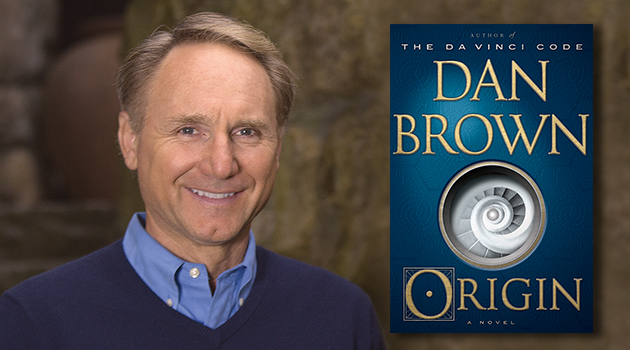A conversation with Dan Brown

Patricia Lynch: The new book, ORIGIN begins with a futuristic unveiling “that will change the face of science” at the stunning Frank Gehry Guggenheim Museum in Bilbao, Spain and the novel explores modern art. That’s a big architectural change up for our favorite code breaker and symbologist, Professor Robert Langdon, who tends to spend a lot of time in classic buildings with equally classical art. Was it a rush or a challenge to go into the ultra modern?
Dan Brown: I’ve had so much fun stepping out of classical world into the realm of modern and contemporary art. Here masterpieces might include a 30-foot-tall puppy made of flowers…a wheelbarrow with a brick in it… or even a sculpture made of fog. While researching Origin, I was fortunate to spend time with modern art specialists and curators who shared with me their expertise and passion. I was able to ask them the one question that so many of us want to ask when we are trying to appreciate particularly bizarre works: “How do we know when something is great art, and when something is just strange?” The answers they offered me were both surprising and enlightening.
PL: From all accounts you were a wonderful teacher at Phillips Exeter Academy and I know you care a lot about young artists whether they are musicians or writers. What was the best piece of advice you ever got as you were developing your considerable talents?
DB: One very common piece of advice given to young writers is: “Write what you know.” The challenge is that we often feel what we know is not interesting enough to warrant a book. The more helpful piece of advice I received was: “Write what you want to know.” This outlook encourages a young writer to embark on journey of discovery and research, allowing his or her enthusiasm for a new topic to help fuel the writing process.
PL: You have a passion for expanding the reader’s knowledge base whether its art, history, religion or science while taking them on a now famous Langdon thrill ride but I find in the core of your books an often deep philosophical question that is complicated and not necessarily easy to answer. Do you start with the thrill ride, the research/learning, or the question?
DB: I always start a book by choosing an ethical dilemma that seems to have no clear answer. (e.g. Would you rather live in a world without science or without religion? Or, if you had to kill half the people on earth to save humanity, could you do it? ) The answers to these kinds of questions live in that “gray area” between right and wrong and help me write books that (I hope) encourage readers to examine their own morals as they read.
PL: A little hometown insight please. What’s your idea of a perfect Seacoast day?
DB: Awake at 4am, spend five productive hours of writing, take a run on Jenness Beach (okay, truth be told, it’s more of a walk), navigate the day’s business calls while wandering our yard with the neighbor’s cat, drive to Portsmouth for early evening tapas at Cava or Upstairs at Massimo’s, and then enjoy a show at The Music Hall, of course.
